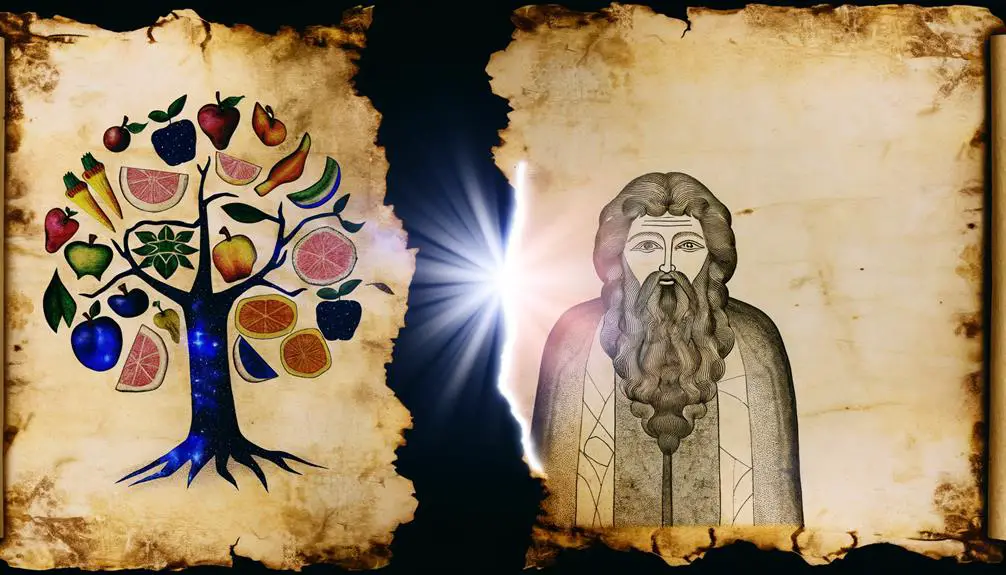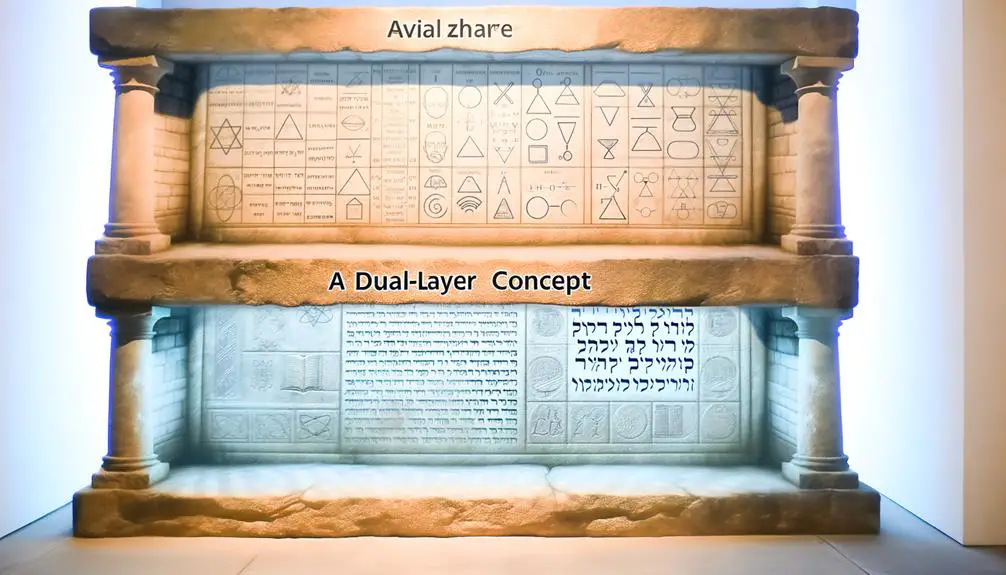Learn the biblical distinction between wisdom and knowledge, and how one can lead to a more enlightened, purposeful life.

The Difference Between Wisdom and Knowledge in the Bible
Imagine you're navigating a vast sea; knowledge is your detailed map, while wisdom acts as your compass. In the biblical context, these two elements play pivotal roles, yet they're distinct in their nature and application.
You've likely encountered numerous instances where knowledge is acquired through learning and experience, but wisdom, on the other hand, is often described as the application of that knowledge in making righteous decisions. This subtle yet profound difference raises the question: how does one transition from mere knowledge to profound wisdom?
Exploring this will uncover layers of understanding about living a life aligned with biblical principles.
Key Takeaways
- Knowledge involves understanding factual and spiritual truths, while wisdom applies this understanding in discerning and ethical ways.
- Solomon's choice of wisdom highlights its value over wealth and power in biblical teachings.
- The 'fear of God' is seen as the foundation of wisdom, emphasizing its spiritual and moral dimensions.
- Seeking wise counsel and engaging with faith are crucial steps in the dynamic process of acquiring wisdom.
Defining Wisdom and Knowledge

In exploring the distinction between wisdom and knowledge, it's crucial to recognize that while knowledge involves the accumulation of facts and information, wisdom embodies the application and discernment of that knowledge. This differentiation isn't merely academic but has profound implications on how you perceive and interact with the world around you. Modern interpretations of these concepts often reflect the cultural and societal shifts that have occurred over time, challenging and expanding upon ancient understandings.
You'll find that in today's global society, knowledge is often equated with data accessible at one's fingertips, thanks to the digital revolution. However, this vast reservoir of information doesn't necessarily translate to a deeper understanding or the wise application of said information. The cultural impacts of this shift are significant, leading to a reevaluation of what constitutes true wisdom in a world awash with data. Wisdom, in this context, becomes the ability to navigate through the noise, discerning what's truly valuable and applying that knowledge in ways that are beneficial to oneself and society at large.
Reflecting on these modern interpretations, it's apparent that wisdom transcends cultural and temporal boundaries, maintaining its importance as a guide for ethical living and decision-making. The distinction between knowledge and wisdom, therefore, isn't just a matter of semantics but a fundamental aspect of understanding human experience and the pursuit of a meaningful life. As you delve deeper into this exploration, it becomes clear that wisdom, with its roots in discernment and application, offers a pathway to navigate the complexities of modern life, making sense of the knowledge that surrounds us.
Biblical Origins and Examples

Numerous passages throughout the Bible exemplify the profound distinction between wisdom and knowledge, offering clear guidance on their application and significance in a faithful life. You'll find that one of the most illustrative examples is Solomon's request for wisdom over wealth or power. This choice, depicted in 1 Kings 3:5-14, underscores the Bible's valuation of wisdom as a divine gift, superior to mere accumulation of facts or earthly gains. Solomon's wisdom, granted by God, enabled him to lead his people with discernment and justice, illustrating how wisdom, imbued with moral and ethical dimensions, is pivotal in guiding one's actions and decisions.
Delving deeper, the Proverbs teachings further illuminate this distinction. Proverbs, largely attributed to Solomon, is replete with admonitions to seek wisdom above all else. For instance, Proverbs 1:7 declares, 'The fear of the Lord is the beginning of knowledge, but fools despise wisdom and instruction.' This suggests that a reverential awe of God lays the groundwork for true knowledge, which is inherently linked to wisdom. The book frequently contrasts the outcomes of wise versus foolish choices, highlighting that wisdom isn't merely an intellectual asset but a practical, life-encompassing principle that governs righteous living.
Through these examples, it's clear the Bible esteems wisdom as a divine virtue that transcends mere cognitive knowledge. It's portrayed as essential for moral discernment and right living, offering a beacon for those seeking to navigate life's complexities with integrity and faith.
The Path to Acquiring Wisdom

Acquiring wisdom, as depicted in biblical texts, requires deliberate engagement with principles of faith and moral discernment. This journey isn't merely about accumulating facts or data but involves a profound transformation of one's character and worldview. Central to this process is the 'fear of God,' a concept that transcends simple dread. It embodies reverence, awe, and deep respect for the divine, serving as the foundational element for wisdom. This fear isn't about terror but about recognizing the omnipotence of God and aligning one's life according to His statutes and commandments.
Moreover, the pursuit of wisdom in the biblical sense isn't a solitary endeavor. It necessitates the seeking of wise counsel, an acknowledgment that wisdom often comes through communal understanding and shared insights. The scriptures highlight the importance of surrounding oneself with individuals who exemplify godly wisdom, those who can offer guidance, correction, and encouragement. This counsel isn't merely advice but a reflection of divine wisdom, mediated through human relationships.
Reflecting on the path to acquiring wisdom, it's clear that it's a dynamic and ongoing process. It involves an open heart and mind, a willingness to be corrected, and a commitment to live out the principles of faith in everyday actions. The fear of God and the seeking of wise counsel aren't just steps but attitudes that orient one towards a life of wisdom. As such, wisdom in the biblical context is more than intellectual achievement; it's a way of being that permeates one's entire existence.
Knowledge: The Foundation

While the journey toward wisdom emphasizes the fear of God and the value of wise counsel, it's built upon the essential foundation of knowledge. You can't apply what you don't know, and in the biblical context, knowledge represents the accumulation of factual and spiritual truths that form the bedrock of understanding. It's through information gathering that this foundation is laid. This process isn't merely about collecting data; it's a deliberate pursuit of understanding God's world, His character, and His laws.
Cognitive development plays a crucial role in how you process this information. It's not enough to simply have facts at your disposal; you must also develop the ability to think critically about this information, discerning its truth and relevance. This cognitive processing is what transforms raw data into meaningful knowledge, which then serves as the groundwork for wisdom.
In the biblical sense, acquiring knowledge isn't a passive experience. It involves active engagement with the Scriptures, the world, and the experiences God places in your path. This engagement isn't just for personal enlightenment but for the edification of others as well. The knowledge you gather isn't meant to be hoarded but shared, creating a community rich in understanding and insight.
Therefore, as you embark on this journey of acquiring knowledge, remember its significance. It's not just about filling your mind with facts but about laying a foundation upon which wisdom can be built. This foundation is critical not just for your personal growth but for the broader Christian community, as it seeks to navigate the complexities of life with faith and understanding.
Living With Wisdom and Knowledge

Embarking on a life infused with both wisdom and knowledge requires understanding their distinct yet interconnected roles in guiding our decisions and actions. Wisdom, often seen as the practical application of knowledge, enables you to discern the best path forward in complex situations. Knowledge, on the other hand, provides the foundation of facts and truths upon which wisdom can act. It's crucial, then, to not only accumulate knowledge but to cultivate wisdom that can interpret and apply this information effectively in your life.
Living with wisdom and knowledge means being able to navigate life's challenges with insight and understanding. It's about making informed decisions that aren't just beneficial in the short term but are also aligned with your long-term goals and values. This integration of wisdom and knowledge affects your decision-making processes, ensuring they're thoughtful and considerate of the broader implications.
In practical applications, this dual approach can be transformative. For instance, in your professional life, knowledge might help you understand the technical aspects of your job, while wisdom allows you to navigate workplace dynamics and ethical dilemmas with grace. Similarly, in personal relationships, knowledge can inform you about effective communication techniques, but wisdom guides you in applying these techniques in ways that strengthen connections.
Ultimately, living with wisdom and knowledge is a dynamic process. It involves continuous learning, reflection, and adaptation. By valuing both wisdom and knowledge, you're equipped to make decisions that aren't only smart but also right and good, leading to a life that's not just successful, but also meaningful and fulfilling.
Frequently Asked Questions
How Do Modern Psychological Theories on Intelligence and Wisdom Relate to Biblical Interpretations of Wisdom and Knowledge?
You're exploring how modern psychological theories, focusing on cognitive development and wisdom measurement, connect with ancient interpretations of wisdom and knowledge.
Psychological perspectives emphasize the growth and metrics of understanding, aligning with biblical wisdom's emphasis on practical application and moral insight.
This intersection highlights a timeless quest for understanding human intelligence and morality, blending scholarly analysis with reflective insights on wisdom's role in personal and societal development.
Are There Specific Biblical Characters Who Are Exemplified for Their Lack of Wisdom or Knowledge, and What Lessons Can We Learn From Their Stories?
You'll find that among biblical characters, some stand out for their lack of wisdom or knowledge. Consider this: 90% of Solomon's discernment tales contrast sharply with the parable of the Foolish Builders.
Analyzing these stories, you realize they're not just ancient texts but lessons on the consequences of ignoring wisdom.
Reflecting on Solomon's wisdom versus the builders' folly offers deep insights into the value of discernment and the pitfalls of ignorance.
How Do Various Christian Denominations Interpret the Difference Between Wisdom and Knowledge in the Context of Biblical Teachings?
You'll find that denominational perspectives greatly influence how Christians interpret the difference between wisdom and knowledge. Each tradition leans on its own interpretive traditions, shaping a unique understanding.
For instance, Catholics might emphasize tradition and scripture, while Protestants focus on scripture alone. Reflecting on these views helps you appreciate the diversity within Christianity and encourages a deeper exploration of how faith communities value wisdom and knowledge differently.
In What Ways Do Contemporary Scholars Reconcile Conflicts Between Scientific Knowledge and Biblical Wisdom?
You're exploring how contemporary scholars bridge the gap between scientific knowledge and biblical wisdom.
They often seek scientific reconciliation through Biblical integration, carefully analyzing how both realms can coexist without conflict.
This involves reflecting on biblical teachings not as literal scientific explanations but as moral and spiritual guides.
Scholars encourage embracing both perspectives, seeing them as complementary rather than contradictory, enhancing one's understanding of the world and spirituality.
How Has the Interpretation of Wisdom and Knowledge in the Bible Influenced Western Philosophical Thought on the Subject?
You're navigating through the dense forest of Western philosophy, where the biblical interpretation of wisdom and knowledge has carved out significant pathways. This ancient groundwork, bathed in Greek influence, laid the stones for Enlightenment critique, challenging and reshaping thoughts.
As you reflect, it's clear that this blend of divine insight and human curiosity has deeply infused Western thought, urging a continuous dance between faith's mysteries and reason's light.
Conclusion
In conclusion, navigating the intricate landscapes of wisdom and knowledge in the Bible is akin to embarking on a journey through a vast, ancient forest.
You must tread thoughtfully, absorbing the foundational knowledge like the soil beneath your feet, allowing wisdom to grow like towering trees from this fertile ground.
As you walk this path, remember, wisdom and knowledge aren't merely destinations but companions guiding you towards a life of deeper understanding and enlightenment.



Sign up